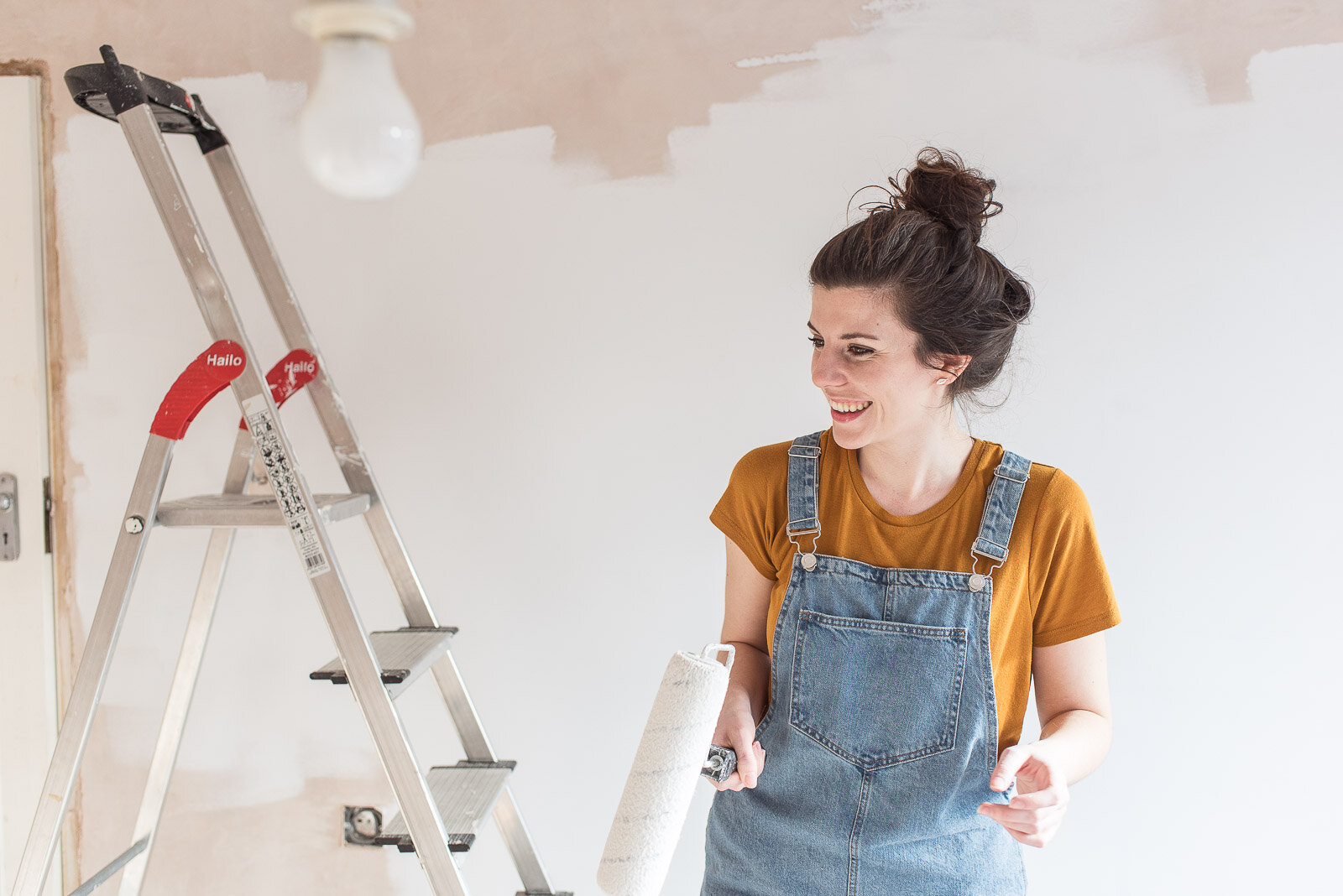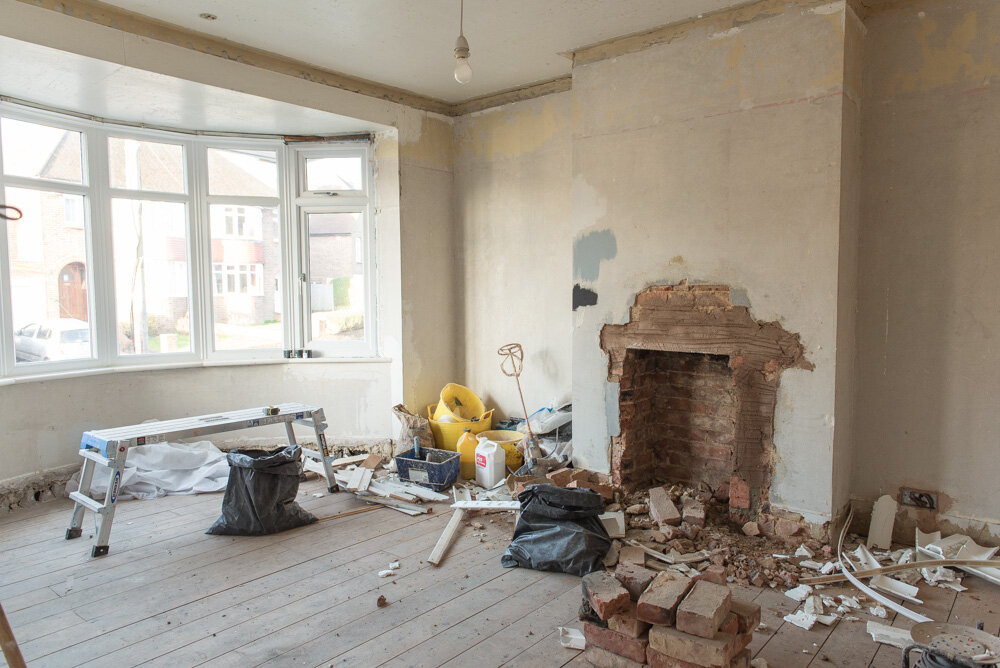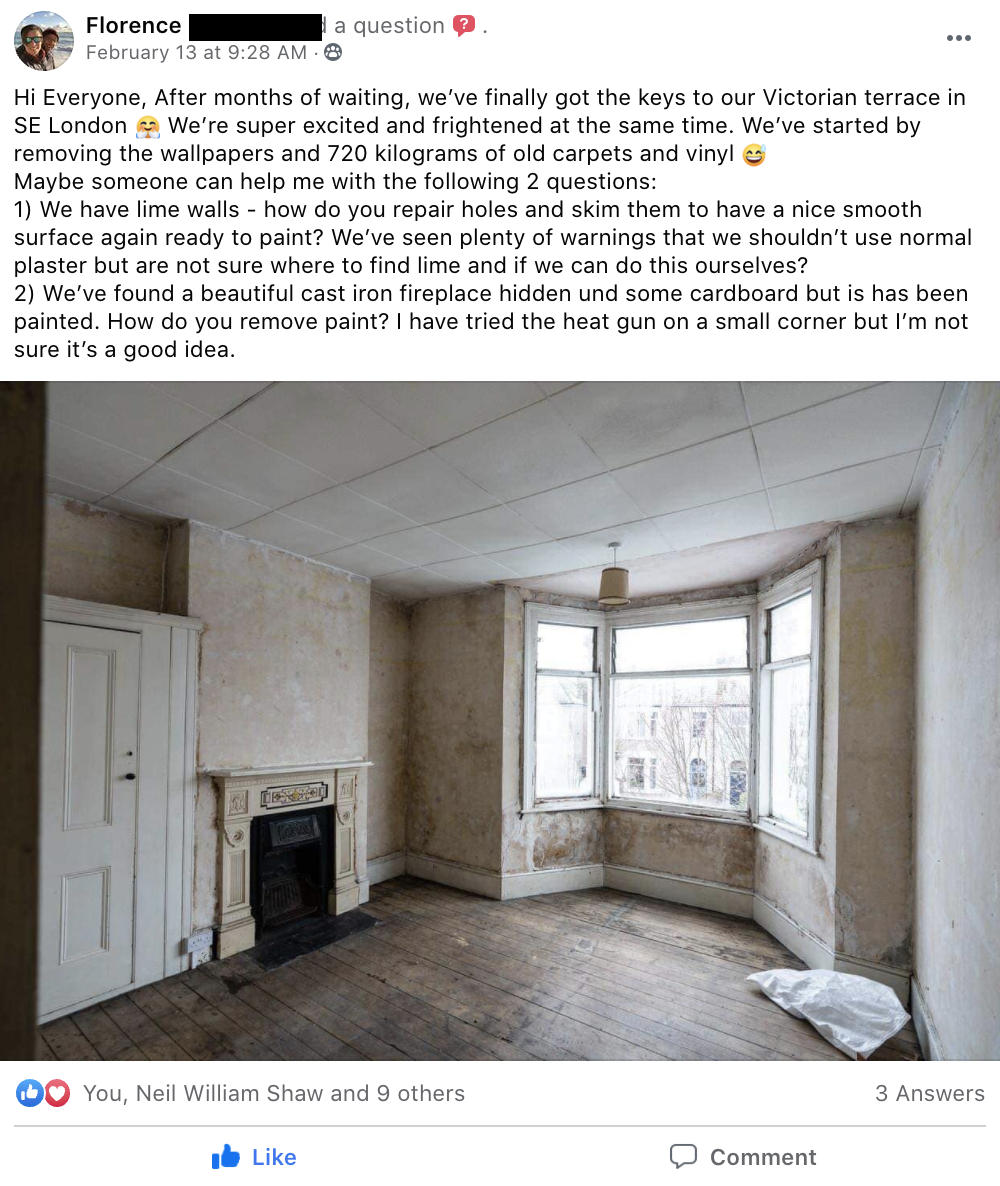What I learnt about renovating in my 20s
This one’s nostalgic 🙈
I found myself looking back on the last 10 years reflecting on what went well, what didn’t, and what I’ve learned that I can take with me into the next decade (or indeed, share with you!)
I could sit here and write about the life lessons learned (there were loads of those!) but the overarching theme and where I’ve learned the most, has been involved in interior design and property.
So below I want to share with you the 5 key lessons I’ve learned about renovating in the hope it helps you feel more confident about taking on your project 😍
Crikey, what a decade it’s been
A quick background before we jump into the 5 lessons…
At 23, I bought my first property with Neil. We eventually 'flipped' our flat, and made 70K in equity in just under 3 years living there. We sold with Purple Bricks and I found myself negotiating the sale (to a European buyer) during the Brexit vote. Totally out of my depth but those conversations in themselves had me gripped for dear life and hooked on property, I learned big lessons really fast.
At 24, I began blogging about interiors, and found myself working with interior brands I adore, Farrow & Ball, The White Company, Anthropologie, John Lewis. The blog started as a way to document life + my passion for design but in the following years I was featured in the i newspaper (that was a weird day, seeing my face on the front page of a paper in a corner shop! I got so embarrassed buying it but luckily it was a tiny pic in the corner so I bought a coke can and placed it on top at the checkout!) and then again I was featured in Style at Home magazine to offer advice on interiors.
At 25, I was invited to Pinterest HQ in London to represent interior design influencers which was such a career highlight at the time. I was also nominated for a Cosmopolitan award in the “Best for Home” category. Didn’t win, but felt like a winner being shortlisted!
At 26, Neil and I made a decision that changed the course of our lives forever. We used that 70K equity to renovate a fixer upper house in Brighton that hadn't been decorated since the 1960s and after viewing many (urine-smelling 😬) properties we couldn’t have imagine what entailed…
4 years later, through documenting our house renovation, and creating tons of helpful resources we became the UK's leading renovations blog.
I then trained to become an interior designer and set up an interior design and online course company offering renovators online support and an interior design service.
Along the way we’ve fully renovated the house of our dreams (OK, I still want a house in the country!) but what’s been the most rewarding part of this decade is to have helped hundreds of thousands of renovators through our online courses, resources, this blog and our AMAZING Reno Club community which I love dearly.
I’m still learning, every day. I consult and advise people on their projects and design. Emails and calls come in from the 1-on-1 work I do, DMs come in and I’m constantly learning on our own projects. Property never sits still, there’s always a new piece of software to draw layouts and elevations on, or there’s a new regulation that needs to be adhered to.
But for anyone starting out on a home decoration or renovation project I thought I’d take some time to share a few things I’m really glad to have learned quickly working in the industry.
I hope this will help you 🙏🏼
What I’ve learned about renovating, if you’re starting out…
This is definitely not an exhaustive list! If I included everything I’ve learned I’d be writing all day! But our online course was created to give more practical guidance on how to get results and prevent mistakes.
Lesson 1: The best planned projects get the best results
This is by far the biggest lesson that I’m glad I learned early on. When you first start out renovating, you’re spending ££s on architect fees, engineer calculations, planning applications and build work. That’s before the new kitchen, furniture, flooring and accessories.
One of the quickest routes to failure or being disappointed with the results, is not planning effectively and not determining early on, what you want.
Especially prior to hiring an architect, designer or tradie. You need to have done some groundwork before making those calls. It starts with budgets, drawing up generous estimates for the work you want to do (which if you’re buying a home should be done well before you’ve bought) and goes on to planning layouts and detailing design choices.
If you can iron out every detail with the information you have before hiring people, you’re going to end up with a better and often more cost-effective finish. When you plan well, there will be no undoing work and no nasty surprises that you don’t have the money for. Your budgets will have planned for that.
When Neil and I produced our renovation course our aim was to provide renovators who didn’t know where to start with an essential framework to progress through. The decision-making process in the first module helps you budget effectively and we packed the course with tools, techniques and structure to manage your project in the right way. Nowadays we regularly get students telling us that the course + community have prevented them from making costly errors.
Lesson 2: Renovations are fluid projects. Be resilient otherwise you’ll get super stressed out.
When projects come in, or when Neil and I are working on our own projects, we plan, plan, plan as per my earlier tip.
Neil usually irons out the finances and hiring contractors side, and I put together the layout and design plans so we know exactly what to ask contractors for and how much the project will cost.
But something I’ve always tried to hold onto throughout my renovation + design experience is the ability to quickly adjust plans if/when unforeseen circumstances pop up…
It could be that your planning application has flagged something and you no longer have consent to do it, your builder has found something that needs work to correct or that the country is running low on plaster supplies (true story during covid!) so you’re having to delay work.
These unexpected scenarios happen all the time in renovations. It can feel like all your efforts determining budgets, and planning your designs have been compromised, but the truth is renovations are fluid and never always run exactly to plan.
It’s essential you have a plan, but you also need the resilience to course correct and get you back on track if it does throw challenges.
Just knowing that it’s OK to go a little off-course, will relax you. Your robust design and budget masterplan will keep you focused.
Lesson 3: In almost all renovations, you need to invest money to save money
This is something I used to have a problem with as someone who naturally wants budgets to stretch as far as possible, but working on projects and seeing other people’s projects evolve I’ve learned over the years how important it can be to spend money if it helps you to save money later on.
I have a few examples to illustrate this. When we moved into our 1930s house renovation, one of the first projects we considered doing was a kitchen extension. We were informed by our architect it would come under the budget we told him we had. So we went ahead and spent ££s on his fees to draw the plans and schedules for the said extension.
Long story short, we later in the project discovered the build would be way above what we felt comfortable spending (we ditched our 80K extension plans) and it led us down the path to getting our full house renovated for virtually the same price. At first we felt like we possibly wasted money on an architect’s fees but without his service we weren’t able to get accurate quotes for the build. With his service we were able to send all the information, drawings, spec, materials to contractors to accurately price up the job which enabled us to make that call to spread our money in a more sensible way (we didn’t need extra space).
Sometimes you have to pay for information that’s going to improve your build or in our case, make informed decisions later.
Take another example, when you instruct a survey on a property you’re buying. You take a risk to some extent as the property sale may or may not fall through and you’ve paid for a survey which ultimately is giving you information to make decisions.
Another example is hiring an interior designer. Sometimes it can feel like it’s too early to hire a designer if you’re still pre-planning phase, but they’ll spot challenges or opportunities to enhance the building before you submit planning applications which can adjust the whole layout.
If your planning application doesn’t get consent, you’ll have spent money on architect and interior design fees, but if you instructed a designer after your planning phase and they’ve spotted a way to enhance your home, it could cost you more to resubmit applications.
Don’t be afraid to get people involved early so long as you’ve done the upfront budgeting, planning, and you understand what you want. As a renovator, it can feel counter-intuitive at the time, but you often have to pay for services you aren’t sure you need yet but what it buys you can be priceless information. It can be hindsight that eventually makes you thankful you did it.
Lesson 4: It’s not an age or money thing
One of my favourite parts of working with renovators is the wide breadth of people joining our home renovation course. We often see young, first time homeowners buying a fixer upper to either flip or renovate to be the home they’ll start a family. But just as often we’ll see third and fourth time homeowners tackling a large renovation for the first time having done lighter redecoration projects on homes through their life. Some can be nervous about where to start and want to be super organised this time round. Others may be reluctant renovators who have bought a renovation simply for the location. It’s all they could afford in the area they wanted and now it’s a savings game to slowly fix it up.
What’s become so clear to me over time is that renovating is not for just the young, or only the more experienced. It’s not only for the rich either. When you’re in no rush, you can still buy a habitable renovation property, live in it and save money to update it room by room. What’s been so amazing over this year in particular has been connecting people from all ages with different property sizes and budgets and watch them share their wealth of experience in property ownership with each other. The Reno Club is like a family! And you certainly need their support when the dust gets too much.
Lesson 5: Don’t just think about now, think 5, 10, 15 years down the line
When we got our hands on our current renovation project, the first thing we agreed as a couple was to renovate well. We wanted to save for the materials we knew would last, and on many occasions we paid that bit more for trades and supplies that we knew would give a great, timeless finish.
We don’t know if we’ll be in this home forever, but we do know that by approaching our renovation with timeless, good quality finishes in mind it has only strengthened the value of the house and the additions we’re making to it.
Similarly from a styling and room-usage perspective, when I develop design concepts for rooms (including client’s homes) I look at the ways I can bring flexibility in design, ensuring the final results can grow with us and future home-owners over time.
Conclusion
These are just 5 lessons I’ve learned about renovating in my 20s, I have so many more that are woven into the How to Renovate a House online course. So if you’re keen to prevent mistakes and get amazing results, consider joining when we open enrolment.
I hope this has got you thinking more about how you can approach your project with confidence.
Thanks for reading guys,
Fi xoxo

















